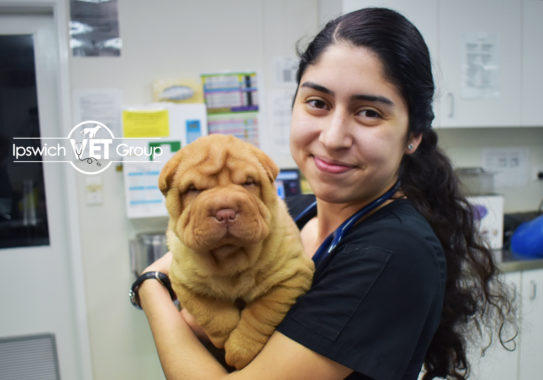We all love our pets, and we want to keep them, and their hearts safe. One of the biggest threats to our pets’ heart is Heartworm. Heartworm is an infectious, potentially fatal parasitic worm that invades the blood stream of cats, dogs, and even humans!
Heartworm is spread by mosquitoes, and our furry friends only need one bite to become infected, so even our indoor pets are at risk. Signs of heartworm disease are subtle, it’s possible that your pet has been infected for many years before showing any signs of Heartworm infection.
The heart and lungs are the main targets of heartworm, so clinical signs are associated with how these organs function. Coughing, panting, lethargy, inability to exercise, collapse and sudden death a are all signs associated with Heartworm disease.
There is treatment for Heartworm disease, however it is expensive and incredibly strenuous on your pets’ body. The best protection for your pet, is prevention.
There are many different prevention options for Heartworm, such as chews, top spot treatment and a once a year injection, for all preferences and budgets, so give us a call to discuss what prevention method is best for you and your pet!


There are heartworm prevention options to suit every pet, and lifestyle. Dogs can be given a heartworm injection by their vet, which protects them for 12 months. This works great if you prefer a flea and tick treatment that doesn’t cover heartworm.
Both dogs and cats have various chewable, tablet and top spot treatments available for treating heartworm. These treatments vary in price, as well as how often they are required to be given. It’s best to chat to your vet about what prevention option is best for you.
It’s important to note that your pet still requires an intestinal wormer alongside their heartworm prevention. It’s always critical to check what the product you are giving your pet covers, to ensure they are fully protected!
Fast Facts about Heartworm
Heartworm is spread by mosquitoes
Just like malaria, heartworm is spread by mosquitoes. An infected mosquito just needs to bite your pet once, and baby heartworm larvae are injected into your pets bloodstream and they make their way to the heart. Because of mosquitoes, indoor pets are still at risk of heartworm infection.
It’s a lot more common than most people believe
Although there have been large advances in heartworm prevention in the last decade, it is still a huge risk to our pets. Many studies have shown up to 70% of dingo populations tested positive for heartworm. Even if our pets don’t come in contact with these wild animals, one bite from a mosquito that has is all your pet needs to be infected.
Cats are also at risk
It is a myth that cats can’t be infected by heartworm. Although it does affect cats a little different to how it affects dogs, they are still just as much at risk as dogs are. Once a heartworm larvae is in a cats blood stream, they try to find their way to the heart, but can often get ‘lost’ and end up in the cats lungs, causing major issues. A cats immune system has the ability to destroy these immature worms, however this still causes major disease and disastrous results for your furry friend.
The best protection, is prevention!
Although there is treatment for heartworm infection, it is costly, incredibly strenuous on your pets body, and often unsuccessful. So it is best to use preventative products to protect your pet against heartworm disease!





